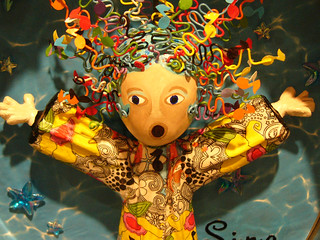Sing the Body Electric - Adjudicating Solo & Ensemble
Tuesday evening I adjudicated a Solo & Ensemble contest and was struck by the goals of each of the young singers. While it's impossible to know all their personal goals without having spoken with them, a few things were obvious: some stood up and sang a song because they love to sing, some because it's what they do in their free time, some want to sing something with their friends, some to learn something, some because they wanted specifically to give the gift of music. Some to do all these things, some just because.

Sing (Photo credit: Kathleen Tyler Conklin)
In a culture where we are expected to sit back and passively take in something that other people have done, a cultlure that teaches us not to feel what we're feeling and just go with it, whatever "it" is, all these young adults chose to stand up and create. They chose to create an experience, to sing in their other mother tongue (read: not English), to challenge themselves, to sing something in a language they don't know, to finish full knowing that they've created an experience for themselves that no one can take away.
As an adjudicator, it is your responsibility to meet each and every student where they are. Students are critiqued on their performance only and it takes a lot of skill to figure out where each student is in their own process at that very moment. It is your duty as an adjudicator, and it is your service as a musician to honor each of them.
It is also really fun!
The challenge lies in finding if each singer is singing the body electric--you must ask yourself, "Is this student singing in a way that is connected to the rest of their instrument (their BODIES), or are they singing passively, unconnected from their hearts, dispassionately? What is making them disconnected? And how can I, as their professional resource, help them connect in a way that is meaningful, that is healthy for their voices, and that they can easily remember? THAT is the key.
Any judge can pick students apart. Anybody can be snobbish and practice thorough jerkism. It happens all the time in music, at all our losses.
Short story: my senior year of high school a judge at Solo & Ensemble came down on me really hard because "I was one of the good ones." (Pretty sick, huh?) I steeled myself for her critique and survived her harsh, egotistical judgement. I took nothing constructive away from that experience because she served her ego. Because she failed to meet me where I was and show me a solid next step in my performance/diction/singing/rhythm/pitch/musicality, she, my accompanist and I all lost that opportunity to grow.
She corrupted that musical experience. With her gigantic ego.
A dedicated teacher shows young singers how they can improve their performance. Professionals use the opportunity to help build the foundation of music in a student's life, whether it's college choir, community choir, a band, karaoke, or simply music at home. As an adjudicator, you are a teacher, a professional, a coach.
So it's up to you as an adjudicator to help connect these students to their bodies, to their voices, to the emotional expression that they are already capable of. It is up to us professional musicians to connect them so they might sing their bodies electric--to sing with their whole bodies, to sing from their hearts, to sing so that the gift of their music increases in dimension--this gift for themselves, this gift for their listeners.
When we work with other singers, we are not only working with bodies and voices, we are working with souls in bodies.
Electric souls in electric bodies giving us gifts of heartfelt sound.

0 comments
Leave a comment